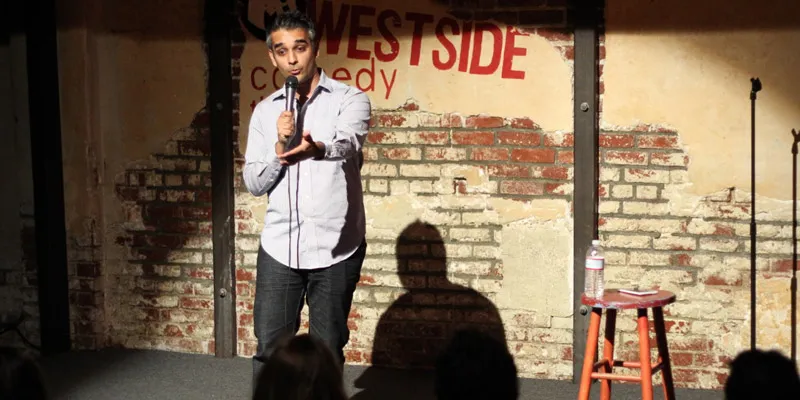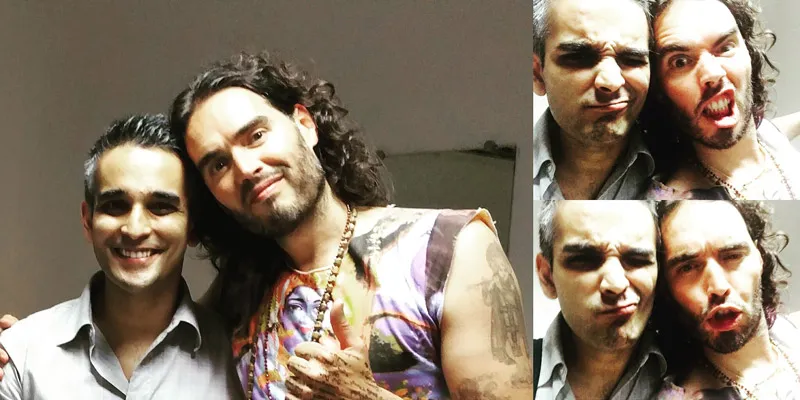‘For the first 25 times on stage I got more silence than laughter’: Sanjay Manaktala
Monday nights are comedy nights in Bengaluru. Students, software engineers, bored executives, and even professors try their hand at standup comedy at the open mics. Bengaluru today boasts of several big names in the comedy circuit - Kenneth Sebastian, Praveen Kumar, Sundeep Rao, Kanan Gill, Biswa Kalyan Rath and of course Sanjay Manaktala.
"When I started standup in Bengaluru, there were hardly any people into it. At one point in time, it was just Praveen, Sundeep and me," says Sanjay Manaktala. Sanjay came to Bengaluru on work. Soon enough, he started doing standup at a pub called 'Cairo.' It was there that he met Praveen and Sundeep.
Every Tuesday, Sanjay would be at Cairo to perform. After the first month, the owner told Sanjay that there was another person who would be doing comedy. It was Sundeep, who had come along with a couple of his friends. And Praveen, too, had come with a friend, Brian. "Sundeep and Praveen were the first two guys in the city to look at comedy and the standup business," adds Sanjay.

Born in New York, Sanjay earned a degree in Computer Engineering in the US, and worked in the software industry for about eight years. "For the first four years I did it wholeheartedly; but then it got a little boring, especially because of its predictability and monotony," says Sanjay.
His interest in standup comedy got him to go to different open mic shows. He began to enjoy the scene, so he decided to quit his job and do standup comedy full time. However, just when he was about to quit his job, he got a post in India. Looking at Bengaluru’s interesting standup scene, which was just picking up at the time, he found the idea of moving to Bengaluru interesting.
The very first standup show Sanjay did was at the back of a pizza restaurant at LA. There were 12 comedians and about ten people in the audience. While Sanjay had prepared for five minutes, he ended up doing only three as he was nervous. "I managed to get one laugh and rest was my voice shaking," says Sanjay. He adds:
"My first 25 times on stage, I got more silence than laughter."
For anything you do in life, Sanjay says, when you find even the tiniest bit of success, you want to keep adding to that. So for him it was one minute of laughter turning into three minutes and so on. Other friends who had joined with him quit. For Sanjay, it was something he would look forward to doing everyday and he really liked it.
When Sanjay began standup comedy, it was practically non-existent in Bengaluru. Russell Peters had done a couple of shows, and apart from that, there hadn’t been much. This, according to Sanjay, was good; for him, it was like coming to a blank canvas. The crowds were receptive, and this helped him develop the skills better.
After coming to India, the main problem for Sanjay was him not having grown up watching the same movies, ads and music videos as his audience. Across India, comedy possesses several Hinglish elements, with punchlines frequently in Hindi. In most of his shows and sketches, Sanjay draws from his own experiences and situations.
Sanjay says that today, India possibly is one of the best places to be in the world for a comedian, as there's so much to do. "There's a lot of demand for comedians today from TV channels, brands, corporates and events," says Sanjay. Also, in Bengaluru, the audience is diverse so the comedy is more English than Hinglish.
According to Sanjay, the scene here is good for a comedian because of the number of open mic nights one gets to perform at. There's quite a platform for new comedians to practice and get better. "Earlier, there was The Polished Bottoms, which Sundeep, Praveen and I had started.We made it more universal and open by calling it the Bangalore Comedy Club. There's a great community of comedians here; we get queries from different parts of the globe," says Sanjay.

While there is a little competition, the community is very cohesive and helpful. Sanjay adds that there also is a community of fans, "There are people who come around three weeks in a row to see a performance because they like the atmosphere, and being a part of it," says Sanjay.
Taking a few pointers on the writing process from an American comedian he once had a podcast with, Sanjay says that you take a blank piece of paper, and then try to stretch your mind and see what's funny about the different elements around you. "That's how I started. For me it was ‘I am an Indian guy working in America. Let me make a joke on how girls contact me only for tech support,’ and things like that." While this works initially, you need to come up with different ideas."
Today, Sanjay tries to live life on stage. If something happens in his daily life, Sanjay jots it down. That will form the base for his comedy scripts. It's the everyday situations and experiences that are likely to get laughs, because audiences connect well with them.
"Comedy isn't about being on stage and waiting to be hired. You need to be very intuitive.It's about blogging, making YouTube videos, being active on social media, and interacting with your fans. Even if I put up a video which is a failure, with only 1000 views, it is still 900 more than a standup show," adds Sanjay.
Sanjay believes that the younger guys have learnt that faster, because of the pace at which technology has been moving. They are truly looking at different venues,rather than just standup and open mic nights.
"There's nothing funny about the funny business." Quoting a comedian, he says, "You're not a comedian until you eat shit on stage. If you get too many laughs when you hit the stage the first time, you either have too many friends in the audience or you're a celebrity."
A real comedian is someone who can perform for bored cardiologists who just don't care, and write ads for some brands, and still go on stage and do videos. "The highs in this business can be really high and the lows can be really low," adds Sanjay.
Sanjay advises new comedians to study other comedians but not copy them. Standup comedy, he says, is something that you need to do even during the day; reading, writing your jokes and researching are all part of the job.







